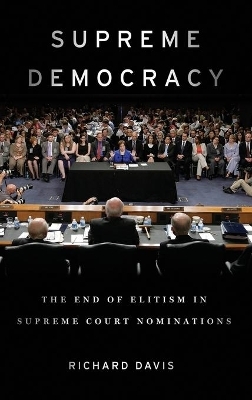
Supreme Democracy
The End of Elitism in Supreme Court Nominations
Seiten
2017
Oxford University Press Inc (Verlag)
978-0-19-065696-6 (ISBN)
Oxford University Press Inc (Verlag)
978-0-19-065696-6 (ISBN)
Supreme Court Nominations in an Age of Democracy explores how the rise of mass media, and the democratization of politics more broadly, has affected the Court, the presidency, and the Senate.
In the nineteenth and early twentieth centuries, the Supreme Court nomination was usually quick and painless. A president nominated a prospective Justice who was typically confirmed within ten days, and with little publicity. It was essentially a process made by elites, with almost no public involvement and relatively little debate. Today, however, the confirmation takes 81 days on average-the latest open seat will take much longer to fill-and it is typically a media spectacle. How did the Supreme Court nomination process become so public and so nakedly political? What forces led to the evolution of the process to its current high profile status? What does the current process look like in comparison to nominations of earlier eras in American political history? How do justices, senators, presidents, journalists, interest group leaders, and even the public interact in the contemporary Supreme Court nomination process? Finally, what does the future portend and what reforms could be implemented to improve the process?
In Supreme Court Nominations in an Age of Democracy, Richard Davis, an eminent scholar of American politics and the courts, traces the history of nominations from the early republic to the present, focusing in particular on how changes in the process have affected the two central institutions involved: the presidency and the Senate. He breaks the process down into its components and examines them one by one: the presidential nomination stage, the confirmation management process, the role of the Senate Judiciary Committee, and the increasing involvement over time of interest groups, television networks, Internet commentators, and-more broadly-public opinion. From there, Davis analyzes how the transformation of the process in recent years has affected both the Senate and the presidency. As a consequence of these changes, the Senate has seen its internal procedures and rules change. It has also affected relations between the two parties within the institution, and reshaped how Senators' interact with constituents. The presidency has transformed, as well. The infrastructure for advancing confirmations has grown enormously, and the president puts far more effort into winning over public opinion than in the past. Needless to say, the relationship between the Senate and presidency has changed too, and in a more acrimonious direction. Partly because of Davis' focus on how institutions evolve over time, this will stand as an authoritative analysis of the Supreme Court nomination process from the founding era to the present.
In the nineteenth and early twentieth centuries, the Supreme Court nomination was usually quick and painless. A president nominated a prospective Justice who was typically confirmed within ten days, and with little publicity. It was essentially a process made by elites, with almost no public involvement and relatively little debate. Today, however, the confirmation takes 81 days on average-the latest open seat will take much longer to fill-and it is typically a media spectacle. How did the Supreme Court nomination process become so public and so nakedly political? What forces led to the evolution of the process to its current high profile status? What does the current process look like in comparison to nominations of earlier eras in American political history? How do justices, senators, presidents, journalists, interest group leaders, and even the public interact in the contemporary Supreme Court nomination process? Finally, what does the future portend and what reforms could be implemented to improve the process?
In Supreme Court Nominations in an Age of Democracy, Richard Davis, an eminent scholar of American politics and the courts, traces the history of nominations from the early republic to the present, focusing in particular on how changes in the process have affected the two central institutions involved: the presidency and the Senate. He breaks the process down into its components and examines them one by one: the presidential nomination stage, the confirmation management process, the role of the Senate Judiciary Committee, and the increasing involvement over time of interest groups, television networks, Internet commentators, and-more broadly-public opinion. From there, Davis analyzes how the transformation of the process in recent years has affected both the Senate and the presidency. As a consequence of these changes, the Senate has seen its internal procedures and rules change. It has also affected relations between the two parties within the institution, and reshaped how Senators' interact with constituents. The presidency has transformed, as well. The infrastructure for advancing confirmations has grown enormously, and the president puts far more effort into winning over public opinion than in the past. Needless to say, the relationship between the Senate and presidency has changed too, and in a more acrimonious direction. Partly because of Davis' focus on how institutions evolve over time, this will stand as an authoritative analysis of the Supreme Court nomination process from the founding era to the present.
Richard Davis is Professor of Political Science, Brigham Young University, and author of Electing Justice, Typing Politics, and Justices and Journalists.
TK
| Erscheinungsdatum | 11.07.2017 |
|---|---|
| Verlagsort | New York |
| Sprache | englisch |
| Maße | 236 x 160 mm |
| Gewicht | 544 g |
| Themenwelt | Recht / Steuern ► Allgemeines / Lexika |
| Recht / Steuern ► EU / Internationales Recht | |
| Sozialwissenschaften ► Politik / Verwaltung ► Staat / Verwaltung | |
| ISBN-10 | 0-19-065696-4 / 0190656964 |
| ISBN-13 | 978-0-19-065696-6 / 9780190656966 |
| Zustand | Neuware |
| Haben Sie eine Frage zum Produkt? |
Mehr entdecken
aus dem Bereich
aus dem Bereich
Organisationen steuern, Strukturen schaffen, Prozesse gestalten
Buch | Softcover (2024)
Rehm Verlag
38,00 €
Buch (2024)
Richard Boorberg Verlag
19,00 €


